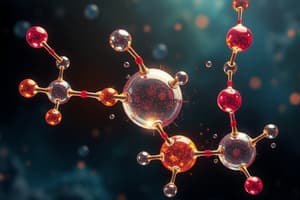Podcast
Questions and Answers
What type of reaction involves the departure of a species that takes a pair of electrons with it?
What type of reaction involves the departure of a species that takes a pair of electrons with it?
- Addition reaction
- Elimination reaction
- Substitution reaction (correct)
- Acid-base reaction
What is the defining characteristic of a good leaving group?
What is the defining characteristic of a good leaving group?
- High reactivity
- High polarity
- Strong acidity
- Relatively stable and weakly basic nature (correct)
What is the nature of a nucleophile according to Solomon’s Organic Chemistry?
What is the nature of a nucleophile according to Solomon’s Organic Chemistry?
- Always negatively charged
- Always a Lewis acid
- May be negatively charged or neutral (correct)
- Always positively charged
What is considered a potential nucleophile?
What is considered a potential nucleophile?
Which theory is used to explain the free-energy diagrams of nucleophilic substitution reactions?
Which theory is used to explain the free-energy diagrams of nucleophilic substitution reactions?
Most of the Lecture Slides are made from the ______ book
Most of the Lecture Slides are made from the ______ book
The nucleophile is always a Lewis base, and it may be negatively charged or ______
The nucleophile is always a Lewis base, and it may be negatively charged or ______
A good leaving group is a substituent that can leave as a relatively stable, weakly basic ______ or ion
A good leaving group is a substituent that can leave as a relatively stable, weakly basic ______ or ion
The Reaction of Tert-Butyl Chloride with Water: An ______ Reaction
The Reaction of Tert-Butyl Chloride with Water: An ______ Reaction
Any negative ion or uncharged molecule with an unshared electron pair is a ______ nucleophile
Any negative ion or uncharged molecule with an unshared electron pair is a ______ nucleophile
Flashcards are hidden until you start studying
Study Notes
Leaving Groups and Nucleophiles
- A reaction involving the departure of a species that takes a pair of electrons with it is called an elimination reaction.
- The defining characteristic of a good leaving group is that it can leave as a relatively stable, weakly basic species or ion.
- According to Solomon's Organic Chemistry, a nucleophile is a species with an unshared electron pair.
- A potential nucleophile is any negative ion or uncharged molecule with an unshared electron pair.
- The theory used to explain the free-energy diagrams of nucleophilic substitution reactions is not specified in the provided text.
Reaction Characteristics
- The reaction of tert-butyl chloride with water is an example of a nucleophilic substitution reaction.
- In a nucleophilic substitution reaction, the nucleophile is always a Lewis base, and it may be negatively charged or neutral.
Additional Context
- Most of the Lecture Slides are made from the Solomon's Organic Chemistry book.
Studying That Suits You
Use AI to generate personalized quizzes and flashcards to suit your learning preferences.




